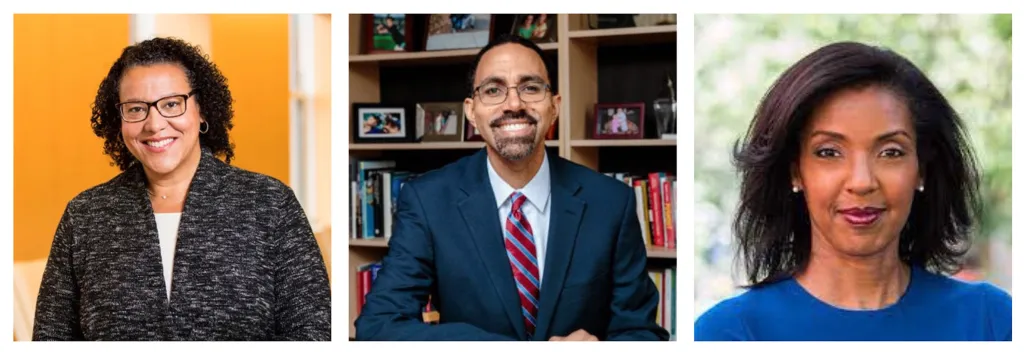
Dinners With Decision Makers
Every year, Neubauer Fellows connect with prominent government, business, and nonprofit executives during our “Dinner with Decision-Makers” series. Fellows engage leaders in intimate “fireside chats” to identify strategies to lead through crisis, manage change, and build high-performing teams.
This year, Fellows interviewed three extraordinary Decision Makers:
- Kimberley Harris, Executive Vice President of Comcast Corporation and the General Counsel of NBCUniversal
- John King, President and CEO of The Education Trust, a national nonprofit organization that seeks to identify and close educational opportunity and achievement gaps, and U.S. Secretary of Education during President Obama’s administration
- Erika James, Dean of the Wharton Business School at the University of Pennsylvania and a leading expert on crisis leadership, workplace diversity, and management strategy
Kimberley Harris’ message that “I belong in this room and have value to add” resonated with and empowered Fellows. Leah Coleman (2019 Fellow) reflected on this affirmation, “As a woman of color, I deserve to be in the spaces where I am.” Kim’s message validated and inspired Fellows to work harder to create not only diverse but inclusive environments where people can bring their entire selves to work. Kim’s message inspired Leah to dismantle old systems of exclusivity. For example, at Leah’s school, new hires now get partnered with staff members with whom they share some lived experience. Leah and Kim remain in touch, and Kim will visit Leah’s school this fall.
John King identified concrete strategies that leaders can implement right now to support students: ensure every student has a positive relationship with an adult in school, set up intensive targeted tutoring and summer programs, and revisit how we organize time and staff. John shared two key leadership lessons from President Barack Obama: 1) make things better – not perfect – so that those who follow you can continue to improve upon the work that you led and 2) only the hardest problems should reach an executive’s desk, forcing the team to collaborate and problem-solve proactively. This resonated with Shakeera Warthen (2017 Fellow) who agrees that this approach builds capacity: “I want both my students and staff to be critical thinkers, with the ability to problem solve for themselves. It is my responsibility as their leader to help them acquire the skills necessary for them to be successful. I am not setting them up for success if I am the one providing all the answers and solutions.”
Erika James outlined strategies to hire and surround yourself with people who align with your vision and values. She emphasized the importance of focusing on your people during times of crisis – if they are stressed, burdened, or not rested, your vision will fail. Erika shared a water hose analogy to illustrate the importance of team alignment – when there are no holes, water flows powerfully in one direction to reach the destination but a compromised hose will leak, losing energy and power. Erika pointed out that misalignment leads to a lack of momentum. Meredith Lowe (2019 Fellow) commented, “Her hose analogy really resonated with me. She emphasized trust and alignment, and I continue to focus on that as a leader.”
Finally, Erika noted the education sector’s reputation for being slow moving and hard to change. However, schools made drastic pivots last year that were previously thought to be impossible. School leaders have a proof point that innovation and rapid change is possible; they just need to create the right set of conditions to constantly improve on behalf of students.